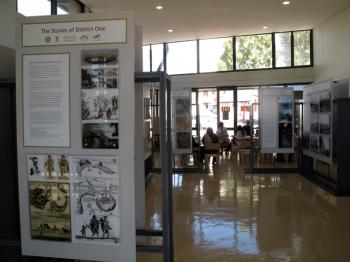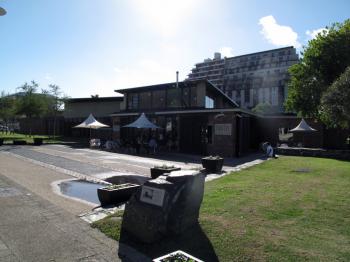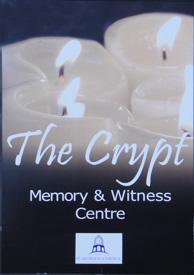Posted on November 21, 2010

This made me to start thinking about, and questioning, the complicated relationship between spaces of memory, heritage and tourism. Post Apartheid South Africa has in the past few years been pre-occupied with the memory project of the country's past. This is true of many nations that have experienced traumatic moments such as the holocaust, genocide, slavery, apartheid, even colonialism. These memory projects usually have to do with etching of the memory of the past onto the present so as to hopefully ensure a better future. Spaces that are developed or are demarcated for the purposes of the memory project tend to be administered or managed by heritage and museum authorities, often intended to serve local people as well as tourists. We know that tourism contributes significantly towards the country's GDP, and that heritage/memory projects often take the needs and interests of tourists into account when planning and managing projects. We also know that most heritage/memory are under-funded and have to find ways of generating income to ensure their sustainability. Many do this by developing facilities such as restaurants or shops that will draw tourists in and encourage them to spend more time, and money. I have visited, and enjoyed several of these, but my recent visit to the Prestwich Memorial made me question the presence of these in our most sacred sites.


The coffee shop at the Crypt, like Truth at the Prestwich Memorial contributes to the sustainability of the memory project. Events such as book launches that are organised by the centre and the coffee shop management, have led to conversations around themes relevant to the memory project being held in the space. At this point I wondered how the Cafe St. George has managed to achieve this when Prestwich Memorial (and Truth) has so far been unable to fulfil its purpose as a space where individuals and groups of people are encouraged to interpret and express the voices of past communities to present and future communities. The presence of Truth at the Prestwich Memorial remains contested in Cape Town, but the establishment does sustain the memorial as envisaged. The exhibition (which ironically also serves as a record for the contestation) has also been criticised for its silences and biases.
The making of the ossuary/ memorial and its associated exhibition appears to have been brought into being at a time when the City and other authorities they were under a lot of public pressure when the appearance of human remains seemed to complicate development in Green Point.
The management of Cafe St George was involved in the Crypt memorialisation project from the start, and is made up of individuals that are familiar with heritage, memory and reconciliation issues. In creating the coffee shop, it was natural for them to create the ambiance of reflection, this is further enhanced by the fact that the space is within a church. Truth on the other hand is owned by an entrepreneur who responded to a tender and may be more concerned about the building a brand and the business of coffee making. The government officials and others that were concerned with the memory project have not been able to provide a management plan for the memorial. Without a management plan, it is difficult for establishments such as Truth to operate within an appropriate framework.
In my opinion, the work of reconciliation is not the responsibility of experts, politicians or activists but that of society at large. However, the notion of active citizenship is not fully developed in our society, and much work has to be done to arrive at the point where this is generally accepted. Once this happens, we may need to create spaces that will enable conversations that have become disavowed to take place. However, the work goes beyond merely having conversations but requires us to look deep within ourselves and our history through multiple lenses, including those of the other.
What is it that makes others feel that certain practices undermine what they consider sacred? What is it that makes some people so oblivious of deep belief systems and why others are still so attached to them? Current reconciliation work has been criticised for the lack of working through our stuff, as it still remains just talk and more talk. According to Pumla Gobo-Madikizela an academic at the University of Cape Town, in dealing with traumatic pasts we have to find a new language to describe our reality and in addition to this, we have to make public spaces intimate so as to make conscious what is unconscious. Gobodo-Madikizela was making this point during a lecture at the Furgard, one of a three-part series of lectures, Living Reconciliation, co-hosted with the Institute for Justice and Reconciliation. This is one of a number of panel discussions, workshops and conference that I have recently attended that are dealing with the work of reconciliation. It is clear that South Africans are far from achieving reconciliation, this becomes evident when ownership is contested, as it seems to be the case of Truth and the Prestwich Memorial.
There is a role that this facility can play and that is in the form of provision of a space where we can honestly engage our contested memories or different ways in which we remember, perhaps this is where we can make an attempt at finding each other. People that I have spoken to about this matter have assumed opposing positions, while some feel that the act of eating or playing music in a burial site is totally taboo, others have argued that in other cultures, celebrations are held in burial places and that burial spaces are not solely for the purpose of solemn and formal activities. In my own experience, visiting family grave-sites entails a number of rituals, the visit has to take place at the crack of dawn, pebbles have to be placed on the grave, the dead are spoken to as a way of communicating with the ancestors and most importantly, one's hands have to washed before re-entering the home or other public spaces. At the Prestwich Memorial, I find that because I am in a globalised space, there is no place for such rituals even if I was compelled to perform them.
All I can do is enjoy the coffee while hoping that the ancestors will understand.
Xolelwa Kashe-Katiya is Deputy Director of the Archival Platform